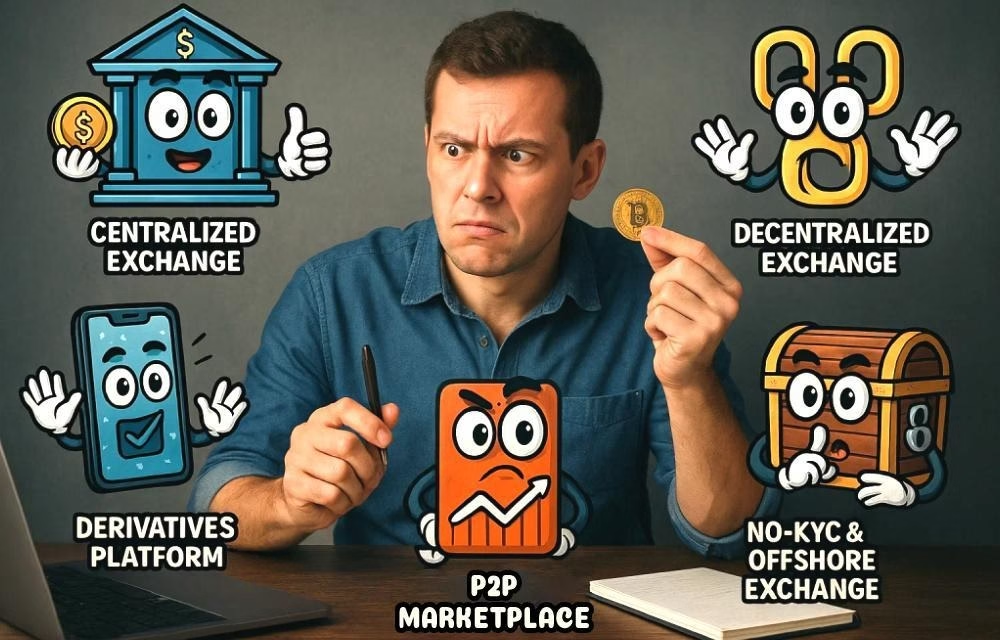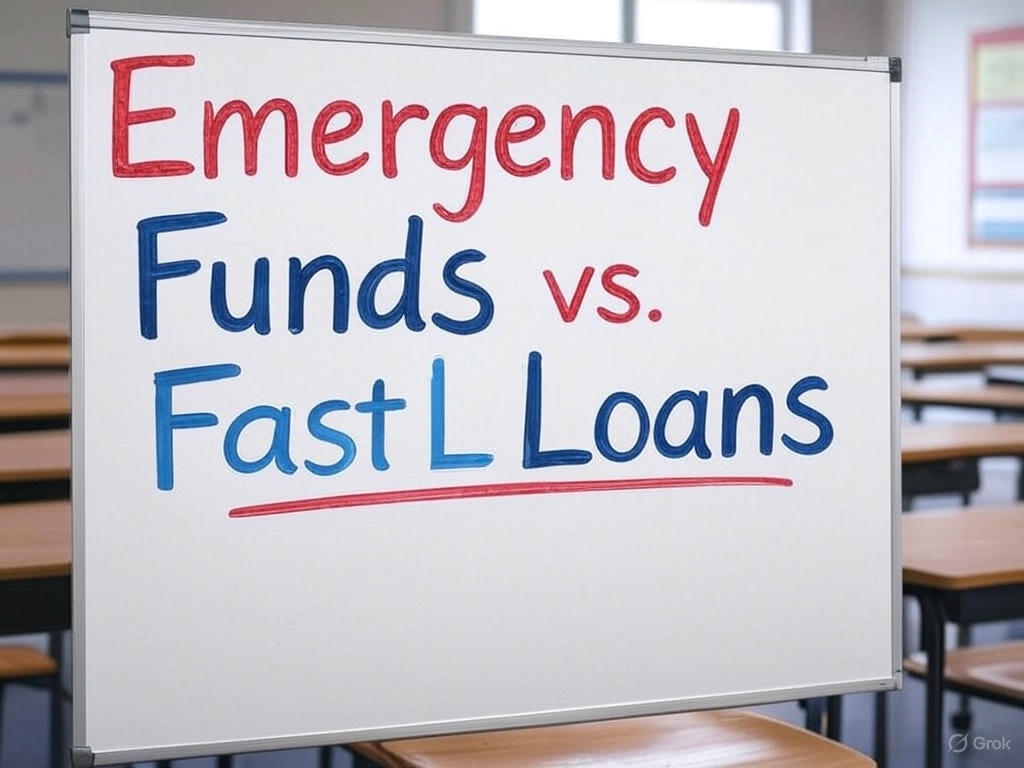You’ve probably run into a wall of words when you tried to buy your first coin. There’s CEX, DEX, P2P, derivatives, KYC, no-KYC, and more. Most of it comes down to one easy question:
Who are you trading with, and who has your money while you trade?
You can trade in a lot of different ways, such as through large centralized exchanges, decentralized exchanges (DEXs) that you join with your own wallet, peer-to-peer marketplaces for direct deals, and specialized derivatives platforms. Also, some traders prefer a no KYC crypto exchange when they need more privacy, live in a country with strict rules, or are just stopped by strict verification rules.
Because there are so many choices, it’s important to know what each model does well and where the real risks are.
What a Crypto Exchange Actually Does
A crypto market is basically a spot where people who want to buy or sell crypto meet and agree on a price. It was worth about $43.8 billion in 2024 and growing at a strong double-digit rate.
However, there are more than 1,000 decentralized exchanges and almost 200 controlled exchanges. This means that choosing the right type is important.
A lot of the time, this is done through an order book, which works like a stock market. Someone posts, “I’ll buy 0.5 BTC at $60,000,” and someone else sells it. Smart contracts and liquidity pools match people who want to trade on autonomous swaps.
Spot trade on the top 10 centralized exchanges was worth about $17.4 trillion in 2024. This is more than double what it was the previous year. Decentralized markets aren’t very big yet, but they’re growing. According to Grayscale Research, DEXs now make up about 7–8% of all trade that happens in the world. This is up from about 3% in 2023.
What are the main kinds of sites you’ll see?
Centralized Exchanges (CEX): The “Normal” Option
First things that come to mind for most people are centralized platforms like Binance, Coinbase, Kraken, OKX, and others. The site is run by a company that keeps user funds in wallets and uses its own systems to match trades.
Pros
It’s easier to use centralized exchanges because they have a long list of trade pairs in one place. A lot of them let you trade on the spot, but they also let you trade on debt and offer a wide range of derivatives, such as futures, perpetuals, and options. Because they are so easy to use, DEXs still only handle a small fraction of the world’s trading traffic. Centralized platforms handle the rest.
Cons
You generally have to show proof of who you are (ID, selfie, address), and you trust the company not to get hacked or go away. Even more pressure is being put on this by regulators. As of late 2024, the EU’s MiCA rules and current AML laws say that platforms must follow KYC/AML rules like banks.
Decentralized Exchanges (DEX): Trading From Your Own Wallet
Decentralized exchanges like Uniswap, Curve, or PancakeSwap don’t hold your funds. You link your own wallet (like MetaMask, Ledger, or another one) and sign a transaction. The smart contract then takes care of the swap. A lot of DEXs don’t have order books. Instead, they use liquidity pools, which let other users input tokens and get a cut of the fees.
Pros
Some people like DEXs because they don’t give you their keys and coins, so you can keep control of them. A wallet link is often all you need to start swapping. You don’t even need an account, email address, or ID. Another thing is that new tokens often appear on DEXs before they do on a big centralized site. This is why many early adopters look there first.
Cons
The trade-offs are real. Smart-contract bugs, fake tokens, and thin liquidity can all burn you. DEX trades also depend on the underlying blockchain. If the network is congested, your swap can be slow, and gas fees spike.
P2P Marketplaces: Direct Deals With Other Users
There is no pooled order book in a peer-to-peer (P2P) market. Instead, you trade directly with another person. You both agree on a price and a way to pay, like bank transfer, e-wallet, or cash in some places. The crypto is then held in escrow until both parties confirm the deal.
Pros
People like P2P platforms because they let them use local payment methods that big markets don’t always accept, like certain banks, e-wallets, or cash. There are also sometimes fewer official KYC checks, which is good for users who want more privacy or have trouble verifying themselves. Particularly, P2P is very helpful in places where banking rules are strict or where there are capital controls.
Cons
People often think of sanctions and local rules when they hear the word “P2P.” Also, because you’re working with real people, security, dispute systems, and reputation scores are just as important as price.
Derivatives Platforms: Futures, Perps, and Leverage
Besides spot trading, there are also derivatives platforms where you can buy and sell contracts instead of coins. For example, you can buy and sell Bitcoin futures, ETH perpetuals, options, and more. A lot of the big CEXs, like Binance, Bybit, OKX, and Kraken, have their own futures markets.
Pros
You can go long or short on derivatives platforms by using borrowed money to increase your account. This makes small changes feel bigger. Through contracts, you bet on how prices will change without actually having the base asset in your wallet.
Cons
There is a real risk of liquidation, and if you’re not paying attention to your levels, a sharp move against you can quickly wipe out your margin. These platforms usually demand stronger KYC and may be blocked in stricter jurisdictions.
No-KYC and Offshore Exchanges: Privacy at a Price
No KYC sites rose sharply in certain regions when local banks or mainstream exchanges started enforcing strict checks or sanctions. Some are smaller, centralized exchanges that let you trade with just an email address and password. Others are P2P or DEX front-ends that are meant to collect as little data as possible.
Pros
Regulators don’t have as much control over how the business is run. If something goes wrong, there may not be much or any legal help available. Scammers and even banned users are more likely to use those places, and the mix of users can bring in the police later, sometimes long after market traders have already put money there.
Cons
If privacy is important to you, using your own wallet along with reputable DEXs and good hygiene is generally safer than putting all of your money on the shadiest offshore CEX just because it doesn’t ask for ID.
Conclusion
What kind of crypto exchange is “best” for you depends on how you trade and how much risk you’re willing to take. They’re also getting bigger and more numerous very quickly. That makes it tempting to just pick the first logo you recognize. Don’t fall for the flashy banner ad. Do your homework instead.





